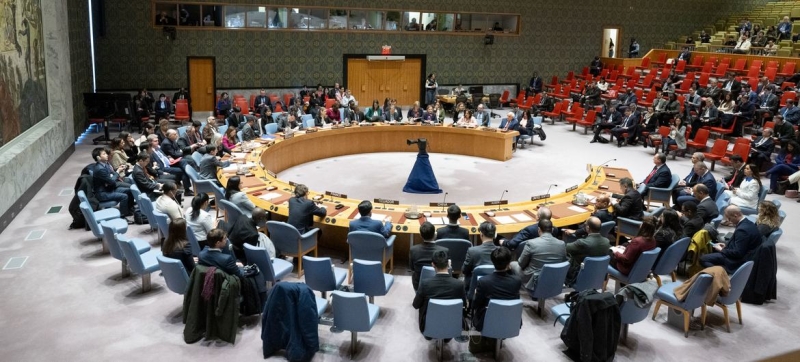
Meeting of the UN Security Council. UN: Children in conflict situations are increasingly excluded from receiving humanitarian assistance Peace and Security
Parties to conflict around the world are increasingly preventing aid from reaching children and denying humanitarian organizations essential access. Almost 4 thousand such cases were confirmed last year. The highest rates were recorded in the Occupied Palestinian Territory, Yemen, Afghanistan and Mali.
The UN Special Representative for Children and Armed Conflict, Virginia Gamba, reported this to the UN Security Council. She pointed to issues such as restrictions on humanitarian activities and the movement of humanitarian convoys, interference in humanitarian operations and discrimination against aid recipients, direct and indiscriminate attacks on civilian infrastructure, disinformation, detention of humanitarian workers, violence against them, and in some cases, killing of humanitarian workers. workers.
The situation will get worse
“Expected “Globally, the situation will worsen over time due to the adoption of restrictive laws, administrative orders and regulations, as well as increased control over humanitarian activities and workers,” Gamba said.
She noted that denial of humanitarian access has long-term consequences for the well-being and development of children and can lead to violations of their fundamental rights, including the right to life, education and health. It also often deprives children of access to safe spaces, as seen in Sudan and the Sahel.
According to Gamba, in some situations there are very serious obstacles to the delivery of aid or outright denial of humanitarian access to children, for example in Haiti and the Occupied Palestinian Territory.
Children in Gaza die from malnutrition and dehydration
Deputy head of the United Nations Children’s Fund (UNICEF) Ted Chaiban said that he visited Gaza in January of this year. According to him, the living conditions of children in the sector have deteriorated sharply.
“Widespread destruction of logistics infrastructure, a quasi-blockade in northern Gaza, repeated denials or delays in granting access to humanitarian convoys, and attacks on humanitarian workers have also seriously impacted access to humanitarian assistance,” – he said.
Chaiban said Gaza had the highest number of UN personnel killed in the organization’s history. A total of 196 aid workers have been killed in the sector since October 2023. The Deputy Head of UNICEF recalled the death of employees of the World Central Kitchen organization.
He said that children in Gaza are malnourished, drink less than two liters of water a day and do not receive the necessary medical care.
“The consequences are obvious. In March, we reported that one in three children under 2 years of age in the northern Gaza Strip suffers from acute malnutrition, a figure that has more than doubled in the past two months,” Chaiban said.
“Dozens of children in the northern Gaza Strip have reportedly died from malnutrition and dehydration in recent weeks, and half the population faces catastrophic food shortages,” he added.
Severe nutritional shortages for children in Sudan
Chaiban also said that in Sudan, which is currently experiencing the world’s largest displacement of children, the denial of humanitarian aid to them is having dire consequences.
“We are seeing record levels of hospitalizations to treat severe acute malnutrition, the most dangerous form of malnutrition, but insecurity prevents patients and health workers from reaching hospitals and other health facilities,” said a UNICEF representative.
Gender issues
Virginia Gamba told members of the Security Council on the gender aspect of denial of humanitarian access. Men and women, boys and girls experience its consequences differently. For example, restrictions on the movement of girls make it difficult for them to access assistance in areas where it is distributed, including in camps for internally displaced persons.
Teenage boys may be perceived as associated with the enemy and therefore denied access to assistance.
Bans and restrictions on female humanitarian workers in several countries, including Afghanistan and Yemen, may impede assistance to women and children and seriously undermine the quality and effectiveness of humanitarian action.
Promotion of assistance to children is enshrined in international law
“Let me be clear: the Geneva Conventions and the Convention on the Rights of the Child contain key provisions requiring the promotion of humanitarian assistance to children in need. Denial of humanitarian access to children and attacks on aid workers providing assistance to children are also prohibited under international humanitarian law,” Gamba said.
She called on all parties to conflicts to resolve and facilitate safe, timely and unhindered humanitarian access to children, as well as children’s access to services, assistance and protection. Gamba recalled the need to ensure the safety of humanitarian personnel and assets.
“Civilians and civilian infrastructure, including hospitals, schools and their personnel, must be protected in accordance with international humanitarian law. “In addition, I urge the parties to refrain from using schools and hospitals for military purposes,” she emphasized.
